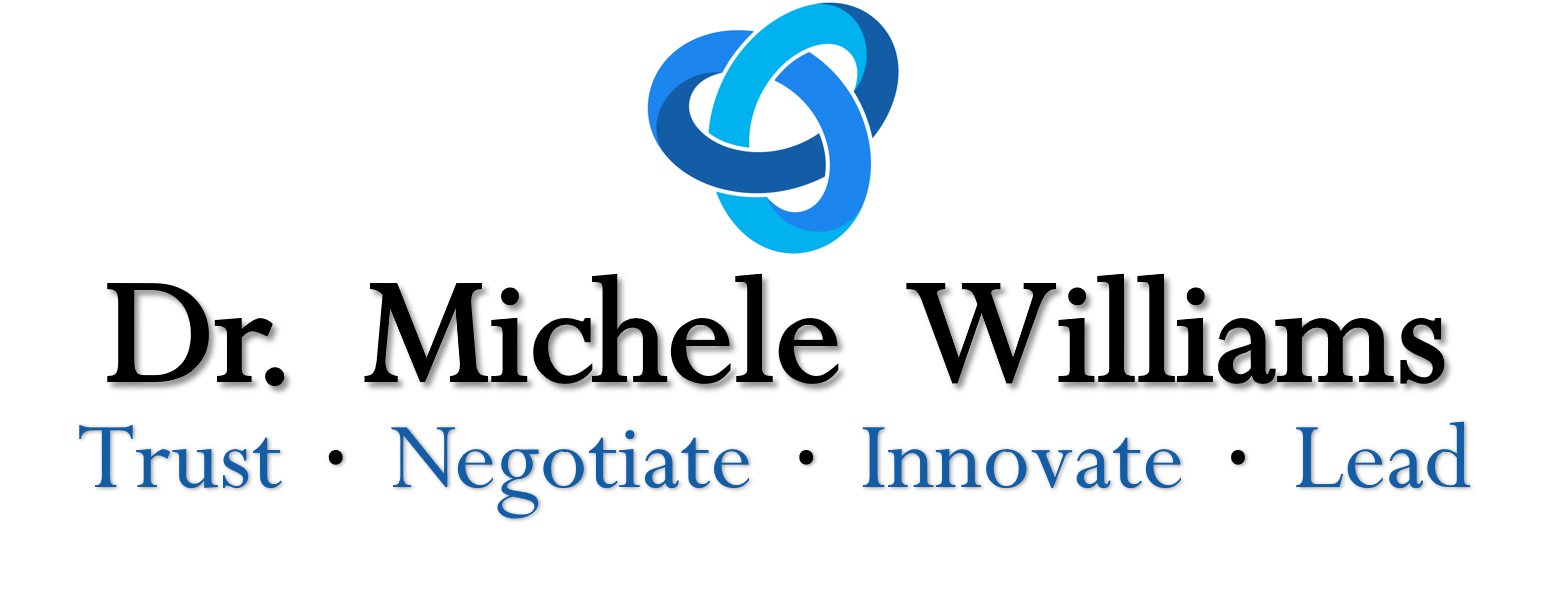Too Nice to Negotiate? 4 Tough Tactics for Nice People


Too Nice?

I’m excited that you’ve chosen to read my new LinkedIn Series: Navigating Communication and Conflict at Work. I will be sharing research-based tips and tools for more effective collaboration at work. I welcome your thoughts on this article. Click ‘subscribe’ to be a part of this community and be notified about upcoming articles. You can place your ideas in the comments section or email them to michele@drmichelewilliams.com.
- Does the thought of negotiating hard leave you cold?
- Do you feel that coworkers take advantage of your help and generosity?
- Do you wait silently for your boss to reward your stellar work with a promotion or raise?
If you answered yes to any of these questions, you may be an overly cooperative negotiator who fears damaging important work relationships. When people imagine hard bargaining, yelling, threatening and slamming doors often come to mind. However, in my experience coaching founders of a wide variety of startups and teaching negotiations to MBAs and executives, effective bargaining often stems https://drmichelewilliams.com/2018/10/26/too-nice-to-negotiate-4-tough-tactics-for-nice-people/ from a combination of setting high aspirations, careful planning and of course, being willing to ask!
But how do you start? Whether you are negotiating a raise, on a committee tasked with deciding where to hold the company offsite or working with a team to decide how to make progress on a complex tech project, I recommend using the 4A’s –Aspire, Analyze, Ask, Assert. The 4A’s are a framework that I developed over the past 10 years by teaching, observing, interacting with and coaching hundreds of aggressive and overly nice negotiators. These steps distill effective negotiation processes into steps that everyone can use without fear of damaging their relationships. Moreover, the steps themselves instill self-confidence, which is critical to successful negotiation outcomes.
1. Aspire
Knowing what you want and deserve is key. Negotiators who set higher targets do better. They claim a bigger slice of the pie. [1]
Reflect: Is my target optimistic? Does it push the limit of what is possible while at the same time being realistic? Does my target value my time and worth sufficiently?
2. Analyze
Do your homework. Gather information. Know your alternatives. What will you do if you do not agree? What is your best alternative if this negotiation fails? Don’t forget to think about the other side’s goals and alternatives too.
Try to understand what each side wants, values and is able to contribute. You will need this information to develop an effective plan of action.
Use the information you have gathered to revise your target for an agreement (update step 1) and to develop a plan to achieve your target.
Reflect: Am I aiming high enough with my target? What is the worst offer that I am willing to accept?
Plan: What will I offer first? What tradeoffs am I willing to make? Are there aspects of this issue that I care less about and can trade for more important things? What rationale will I use to support my requests?
3. Ask
“First you have to Ask” is the aptly named title of an article by Linda Babcock and Sara Laschever, authors of Women don’t Ask. If you don’t ask for want you want, it is very unlikely that your boss or coworkers will first discover what you really want and then put effort into figuring out a way to give it to you that will also meet their own needs.
So what happens next? Ask for your optimistic target and then don’t stop asking! Questions allow you to gather more information so that you can update your plan (update step 2).
For example, ask the other party “Help me understand why this is the best solution?” or “Tell me more about why this proposal (that I made) won’t work?” Asking for clarification and feedback is a tough tactic because it allows you to put off making immediate concessions and can give you the information you need to refine your offer and approach. It also provides information to make an offer that benefits both you and the other party.
Reflect: Do I have enough information about the other person’s goals and alternatives? Do I understand how they see the situation, what options they prefer and what they will do if this negotiation fails?

4. Assert
Confidently saying “no” to offers that are worse than your alternatives is key. Steps 1 through 3 are likely to increase your confidence in negotiation because you have plan, know what you want and have gathered critical information.
Confidence is important not only because it influences how others respond to you but also because confident negotiators are more likely to persist.
The idea of saying “No” to unreasonable offers from someone important like your boss or a close colleague may make you want to run for cover. But try rethinking the meaning of “No.” “No” does not mean, “I reject you and all that you stand for;” it means your solution to our mutual problem may not be ideal or even possible.
For example, when your boss asks you for a new budget report by then end of the day, it is probably unwise to say “No, I can’t do that. I planned to work on something else today.” Instead your “no” might sound like a question, “You need a new report by the end of the day? The last one took two weeks to generate and fuly confirm with all of our divisions.” To which your boss might reply “Well I need it much sooner than two weeks,” which opens up a negotiation about time frame. Or she might reply, “Yes I need it today or by the morning at the latest,’ which could open up a negotiation about resources and people who could help meet that deadline. Offering a generative “no” allows for further conversation and problem solving.
Chris Voss, a former FBI hostage negotiator, emphasizes that “No” is often the start to a negotiation not the end of it. Of course, how you say no matters. I recommend Peter Bregman’s “Nine practices to help you say no!”
Remembersometimes a request or negotiation hits you unexpectedly. For instance, your coworker might approach you with a request as you are walking down the hall or sitting down to lunch. Don’t panic! Recognize that these spontaneous encounters are also opportunities to negotiate and remember the 4A’s –Aspire, Analyze, Ask, Assert. See if you can postpone the negotiation with a generative “No.” Even if it’s an urgent matter you probably have time to go to the restroom (hopefully with your mobile device), gather more information and set a target. Taking just a few minutes to think about your target goals and alternatives can make all of the difference.
Reflect: Have I set my target and planned sufficiently? Have I prepared several ways to say “no” to unreasonable request that will keep the relationship going and give me time to plan?
Now I would like to hear from you. Please share your negotiation experiences in the comments.
The Unexpected
Remember sometimes a request or negotiation hits you unexpectedly. For instance, your coworker might approach you with a request as you are walking down the hall or sitting down to lunch. Don’t panic! Recognize that these spontaneous encounters are also opportunities to negotiate and remember the 4A’s –Aspire, Analyze, Ask, Assert. See if you can postpone the negotiation with a generative “No.” Even if it’s an urgent matter you probably have time to go to the restroom (hopefully with your mobile device), gather more information, and set a target. Taking just a few minutes to think about your target goals and alternatives can make all of the difference.
Now I would like to hear from you. Please share your negotiation experiences in the comments.
A version of the post appeared on the website: negotiatorsway.com
#LinkedIn #Communication #Collaboration #Negotiation #Conflict #Trust #LinkedInSeries #infographic
[1] (Thompson, 2012), Photo by William Iven on Unsplash

About the Author
Dr. Michele Williams (University of Michigan, Ph.D.) is assistant professor and the John L. Miclot Fellow in Entrepreneurship at the Tippie College of Business, University of Iowa. She is also a scholar with Cornell University’s Institute for Health Futures and with the Smith Family Business Initiative at Cornell’s Johnson College of Business.
Michele has
taught negotiations to executives, startups, MBAs and undergraduates at leading
schools of management for over 10 years. She is co-author of the Four Capabilities Leadership Assessment—an online 360° assessment used by organizations to
enhance the leadership potential of managers. She speaks internationally on topic related to her research on
trust, sustaining high-performing
work relationships and women in business and entrepreneurship.
Follow Michele on Twitter @MicheleWilliamz.
©2018 Michele Williams. All Rights Reserved.
